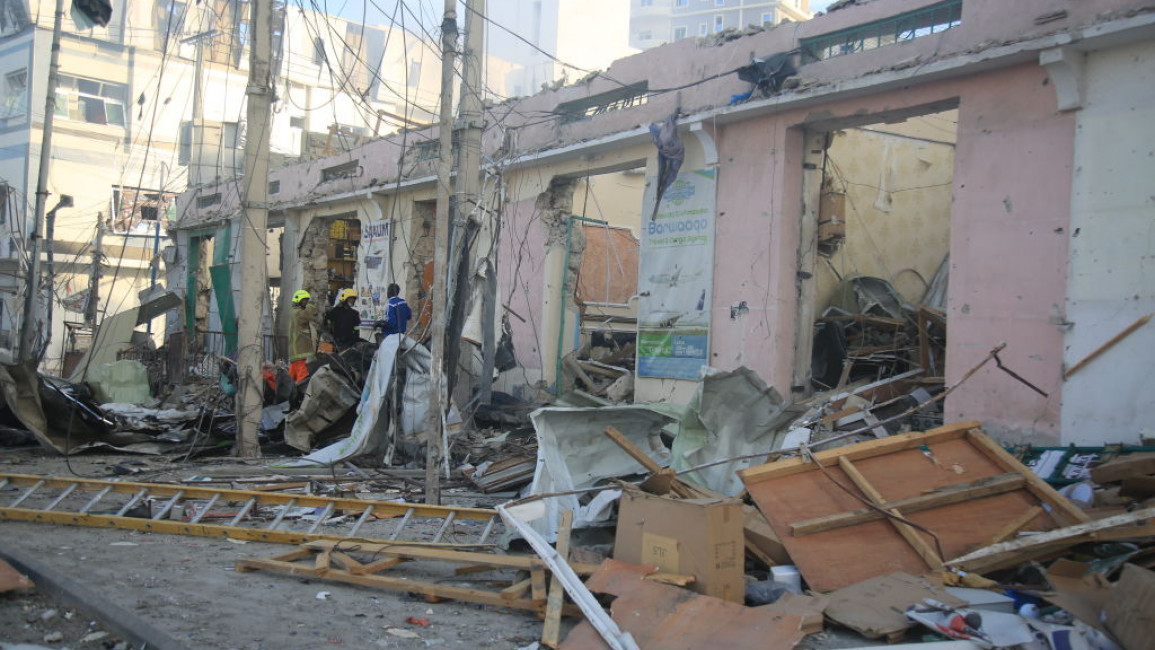Somalia: Death toll from twin Al-Shabaab bombings rises to 100
The number of people killed in twin car bombings in the Somali capital Mogadishu, claimed by Al-Shabaab Islamists, has risen to 100, President Hassan Sheikh Mohamud said on Sunday.
"So far, the number of people who died has reached 100 and 300 are wounded, and the number for both the death and wounded continues to increase," he said after visiting the blast location.
Two cars packed with explosives blew up minutes apart near the busy Zobe intersection, followed by gunfire in an attack targeting Somalia's education ministry.
The afternoon explosions tore through walls, shattered windows of nearby buildings, sending shrapnel flying and plumes of smoke and dust into the air.
The victims included women, children and the elderly, police spokesman Sadik Dudishe said.
"The ruthless terrorists killed mothers. Some of them died with their children trapped on their backs," he said on Saturday, adding that the attackers had been stopped from killing more "innocent civilians and students".
The attack took place at the same busy junction where a truck packed with explosives blew up on October 14, 2017, killing 512 people and injuring more than 290, the deadliest attack in the troubled country.
Mohamud described the incident as "historic", saying "it is the same place, and the same innocent people involved."
"This is not right. God willing, they will not be having an ability to do another Zobe incident," he said, referring to the Islamist group Al-Shabaab.
Al-Qaeda-linked Al-Shabaab claimed responsibility for the attack in a statement, saying its fighters were targeting the ministry of education.
The bloody siege drew international condemnation from Somalia's allies, including the United Nations, Turkey as well as the African Union force tasked with helping Somali forces take over primary responsibility for security by the end of 2024.
The UN mission in Somalia UNSOM vowed to stand "resolutely with all Somalis against terrorism."
"These attacks underline the urgency and critical importance of the ongoing military offensive to further degrade Al-Shabaab," AU Transition Mission in Somalia (ATMIS), which replaced the previous AMISOM peacekeeping force, said on Twitter late Saturday
Al-Shabaab have been seeking to overthrow the fragile foreign-backed government in Mogadishu for about 15 years.
Its fighters were driven out of the capital in 2011 by an African Union force but the group still controls swathes of countryside and continues to wage deadly strikes on civilian and military targets.
In August, the group launched a 30-hour gun and bomb attack on the popular Hayat hotel in Mogadishu, killing 21 people and wounding 117.
Mohamud, who was elected in May, vowed after the August siege to wage "all-out war" on the Islamists.
In September, he urged citizens to stay away from areas controlled by jihadists, saying the armed forces and tribal militia were ratcheting up offensives against them.
Al-Shabaab remains a potent force despite multinational efforts to degrade its leadership.
The group last week claimed responsibility for an attack on a hotel in the port city of Kismayo that killed nine people and wounded 47 others.
Somalia has been mired in chaos since the fall of president Siad Barre's military regime in 1991.
His ouster was followed by a civil war and the ascendancy of Al-Shabaab.
As well as the insurgency, Somalia - like its neighbours in the Horn of Africa - is in the grip of the worst drought in more than 40 years. Four failed rainy seasons have wiped out livestock and crops.
The conflict-wracked nation is considered one of the most vulnerable to climate change but is particularly ill-equipped to cope with the crisis as it battles the deadly Islamist insurgency.


![Minnesota Tim Walz is working to court Muslim voters. [Getty]](/sites/default/files/styles/image_684x385/public/2169747529.jpeg?h=a5f2f23a&itok=b63Wif2V)




![Israeli officials are considering exiling Yahya Sinwar to Sudan as part of a deal to end the war [Getty]](/sites/default/files/styles/image_212x120/public/1251837582.jpeg?h=127ba027&itok=UTeIubIr)
![Debris near Rafic Hariri International Airport [Getty]](/sites/default/files/styles/image_330x185/public/2176162423.jpeg?h=a5f2f23a&itok=MCSK9mkM)
![An Israeli air strike on Jabalia killed teenage journalist Hassan Hamad [Screengrab/X]](/sites/default/files/styles/image_330x185/public/2024-10/hassan%20hamad1.jpg?h=c12e0b96&itok=Rd_dyCVp)